T H E D I S T A N C E S and / or C I T I E S (7)
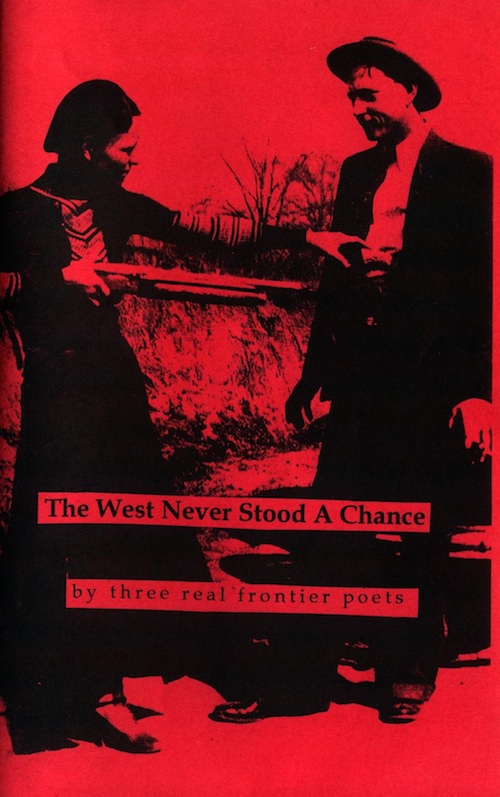
Collaboration is an ideal hands-on way for two or more poets and/or artists to get to know each other's imaginations from the most intimate level on up. My earliest experience with writing poems with others came my first year in Poetics, hanging out with fellow students MC Litton and Melissa Weinstein. We began a weekly ritual of attending a poetry reading every Friday and/or Saturday night after which we'd head to a nearby drinking establishment, maybe grabbing a burrito along the way. Once ensconced at a table with drinks at hand out would come the notebook or napkin along with a pen and we'd pass it round as we chatted about the reading and classes or what not. Not every night resulted in what would pass for poetry of merit but here and there we hit some fine imagery and wordplay. Much of this writing, likely far too much, we later gathered together in a little chapbook The West Never Stood A Chance (Penniless Rumsoak press, October 1, 1999).
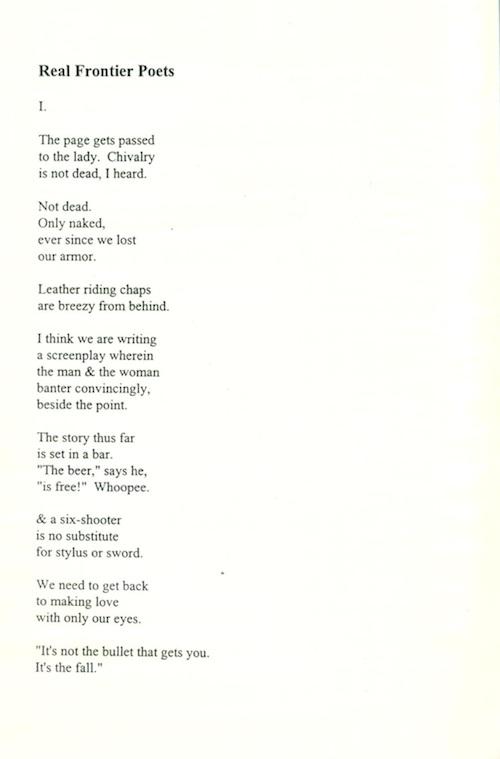
This poetry won us no awards and I don't recall much on the way of personal accolades either, other than Tom Clark quite humorously appreciating a poem about kissing Dick Gallup "that's how i kiss dick gallup, / dick gallup" that got handed to him in class via some other means prior to its publication in our little book. Gallup was sort of around, driving cabs in San Francisco, and giving the occasional reading. His Shiny Pencils at the Edges of Things came out a couple years later, I recall a few of us spending a little time around him and some chitchat on a fun BART ride back to the city after a reading he gave at Moe's Books in Berkeley. He's one of the all-time too abundantly under-appreciated greats.
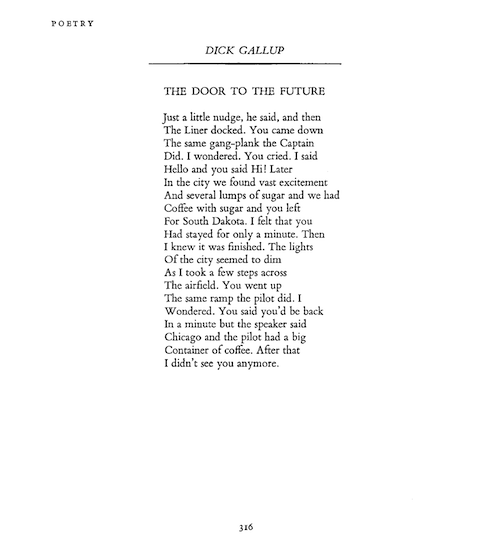
Collaboration just seemed to be in the air. In my bathroom at home I have a copy of a small collaborative set of poems written by Ed Berrigan, Noel Black, and Will Yackulic. I'm not sure how it came to be into my possession but it was clearly written and published in years prior to my arrival in the city. I met Noel fairly early on and saw him somewhat regularly, but Yackulic only became a friend years later and Berrigan I've met just briefly on one occasion. I do have a hazily distant memory of being at a party where all three were present and there was some home brew on hand, however this little booklet definitely came my way several years later.
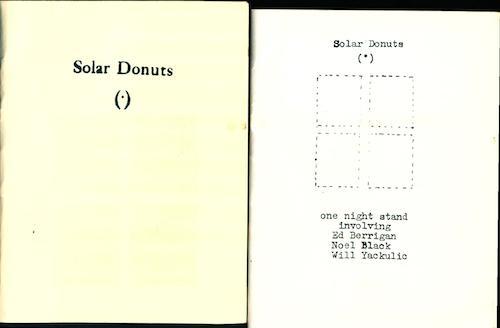
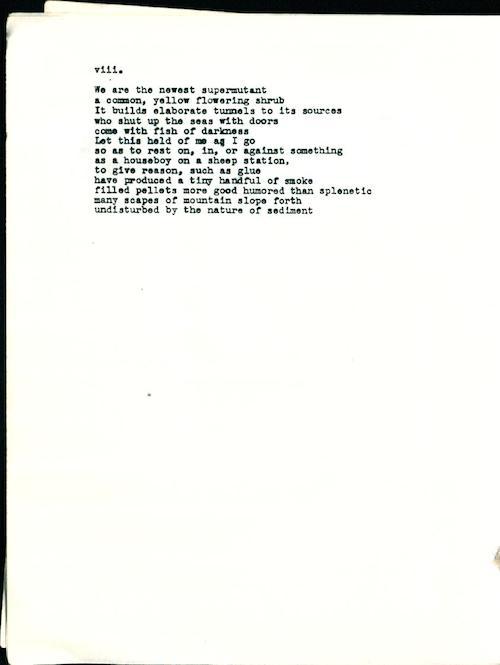
I was also on the editorial board one year for the Poetics "house mag" Prosodia under the tutelage of George Mattingly of Blue Wind press. We decided upon, or perhaps some of us may have insisted upon, a "collaboration" issue. It holds up pretty well with front cover art by Tom Clark and a back cover photo by Skip Fox.
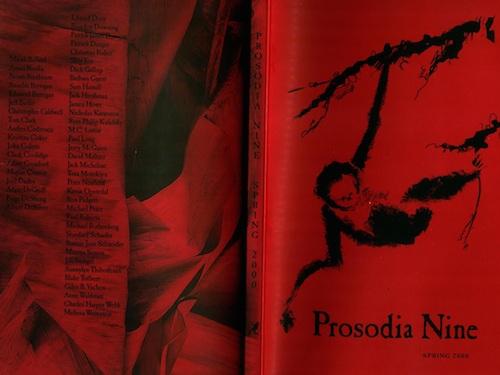
Glancing at the contributor names listed on the back, aside from remembering some notable collaborations; Tom Clark and Barabara Guest; Anselm Berrigan, Edmund Berrigan, and John Coletti; Dick Gallup and Andrei Codrescu; Standard Schaefer and Jill Stengel; Christina Fisher and Micah Ballard; etc I'm delighted to be reminded of Jack Micheline's work being included, a couple of poems and a straight-up "why don't you publish me? p.s. you suck as a poet" letter to Lawrence Ferlinghetti, and the absolutely superb essay "Doc-I-Meant" by Amiri Baraka which have always rewarded repeated re-readings over the years.
I'm sure that a huge part of this being a "collaboration" issue came no doubt in large part from out the fact that Clark taught a "Collaboration" workshop during my second year in the Poetics Program. This entailed splitting the class into two groups that would work independently of each other to arrive at a "complete" poem "composed" during the duration of each class meeting. To help the group along everybody was not only encouraged to arrive at each meeting with a poem of their own (Clark assigned a weekly topic to write on), ripe for classmates to steal both lines and inspiration from, but also were expected to be independently outside of class time compiling individual lines or groups of lines on sets of index cards which then could be brought out during each class and mined by the group for potential material for that week's collaboration. At the end of every class meeting the groups would come together and read, or rather Clark would read, aloud the freshly completed poems. There was also the urge to publish a chapbook of the collaborations and the idea of coming up with a name and identity for the "poet" behind the work. I believe Clark had taught this workshop in previous years. He definitely taught it at least one or two other times in later years.
In the years since I have participated innumerable times in a variety of collaborative settings. Most commonly this entails a group of pals hanging out at one or another's pad with a bit of something social for lubrication, the typewriter out, taking turns in the seat as the rest continue talking and music is on. Among my friends, the collaborative book best representing results of this practice is Death Race V.S.O.P. written by Micah Ballard, Cedar Sigo, and Will Yackulic. (I would include a cover image of this impressive little book published by the ever migrant Red Ant Press, yet as its dark black on black reversed blind embossed lettering you'd better just find it for yourself.)
After I returned to San Francisco from my stint living in Portland, I entered into one of the most exciting, and terrific in terms of the results, collaborations: Easy Eden (PUSH 2009) with Micah Ballard. We even turned out a collaborative collage for the cover:
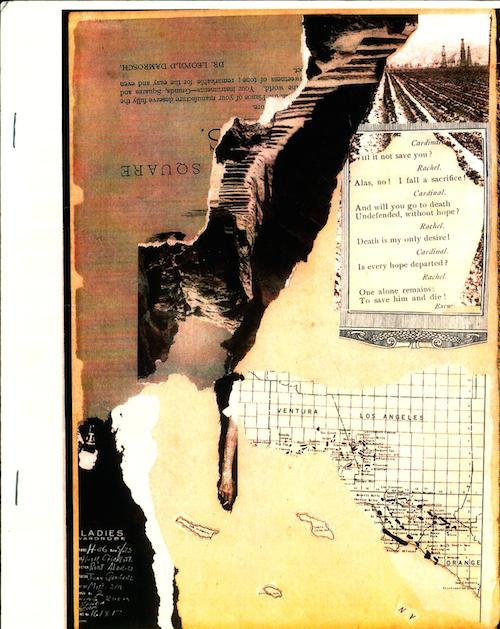
I must admit that this felt to be a more mature collaborative effort than my previous affairs. By this time we both came to be working at the University of San Francisco and regularly communicating by email on nearly a daily basis, as we continue to do this day exchanging updates on our personal lives as well our new poems and other bits of news. We also tend on occasion to take short breaks together when Micah swings through the library. These generally involve a visit upstairs to the books stacks to peruse through art books and/or poetry. After one of these visits, or perhaps during(?), we picked up book(s) by Barbara Guest for a bit and at some point I found myself reading her poem "Safe Flights." Something in the opening lines "To no longer like the taste of whisky / This is saying also no to you" and the repetition of "no longer" throughout the poem, e.g., "To no longer travel over mountains," triggered a desire within me to respond with a poem of my own and out came the following poem. I believe I was simultaneously reading an interview with her wherein she mentioned "the seacoast states" and I dug the sound of that.
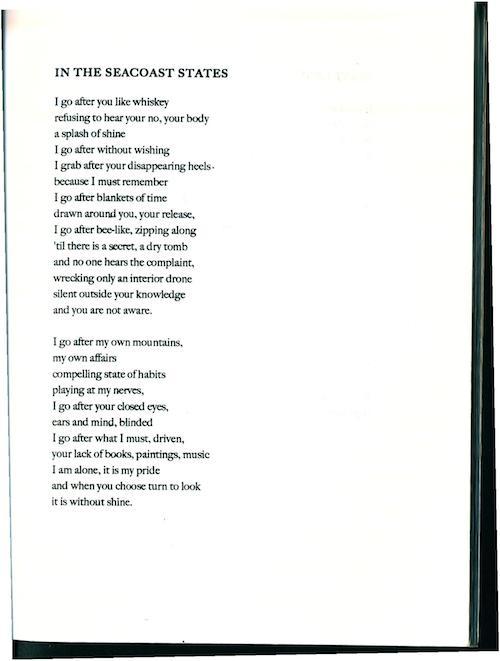
I emailed this poem to Micah, noting that it was "written over/against/through a poem of Barbara Guest" and he replied within an hour or so: "Hot damn! That’s a good one man. Such that I had to get some play myself. / Written with, from, and through Barbara & you"
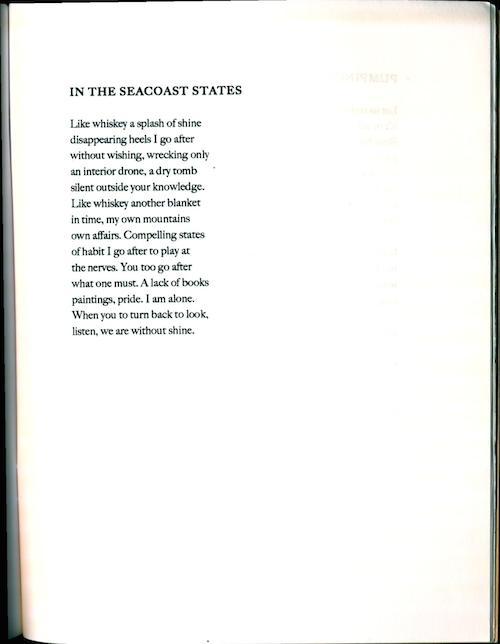
Which was obviously great fun to receive. Soon after it became a weekly habit to share poems in this fashion, rewriting in turn each other's rewrites of a poem by this or that poet we came across. In no time we had a little book manuscript which Jason Morris of PUSH turned out to be delightfully amenable to putting out. I think Micah and I had already realized the cover collage over drinks at a local establishment, we even had an alternate:

So we met again with Jason at the same establishment and came up with a collaborative "blurb" of our own for the back cover.
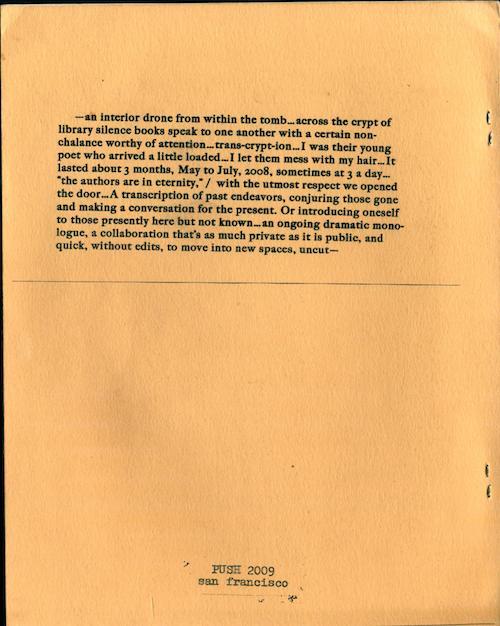
Most recently my collaborations have been primarily the practice of translation with my partner Ava Koohbor. We began translating together a few years ago shortly after we met. First with her own poems written and first published in her native Farsi. After a couple of years of us working together, she now more often than not translates her work from Farsi on her own. Or she simply writes directly in English as with her last book of imagined conversations between John Cage, Morton Feldman, and Marcel Duchamp. Currently, we're working on a project translating the classical Persian poet Hafez.
As Hafez translator Dick Davis notes: "Certain poets are held to be untranslatable, or virtually so, and often they are thought of as those that most intimately express the poetic soul of their people: in Russian there is Pushkin; in German, Goethe; in Persian, Hafez." We're more or less ignoring this attitude and accompanying set of concerns. Ava chooses the ghazals (this is the classical Persian poetic form in which Hafez composed all his work) based upon a set of themes of sorts we're interested in pursuing (we just completed translation of seven ghazals having to do one way or another with "alchemy"). Ava first reads the Farsi aloud. We then take on each beyt (which in English would be comparable to a line or pair of lines) going word by word. She explains the concept at work in the poem and we tackle the unexplainable portions together. Generally every translation takes three to four hours while she slowly drinks tea and I slowly sip cognac.
This has proved to be invigorating and thrilling collaborative work. I take the translation practices of Ezra Pound and Paul Blackburn as loose guides in the back of my head, exploring a colloquial syntax and wandering the space of the page generally eschewing rhyme as we go. An opening couplet which translated into English might go something like "Those who turn lead into gold / Will they ever our sight behold?" gets turned out by us as:
Those alchemical seers
tilling gold from soil
what chance
we’ll catch their eye?
This is absolutely ridiculous amounts of fun and fully informative towards all my other writing. I feel as if we end up with some nicely updated versions. For instance, at the end of each ghazal Hafez always addresses himself, usually giving some self-advice that he'd benefit heeding in the future. I've been really happy with how some of our endings have turned out.
Don’t pal around with just anybody
Hafez, keep it real
hang with those agnostic
ones in the know
For years I've worked on some translating on my own but not having any other language than English I have always been forced to rely on crib sheets of other translations and accompanying dictionaries. While I still do favor some results of such exercises, and I intend to return to these practices in the future, it's entirely satisfying in a whole other fashion to turn out these truly collaborative translations with Ava.
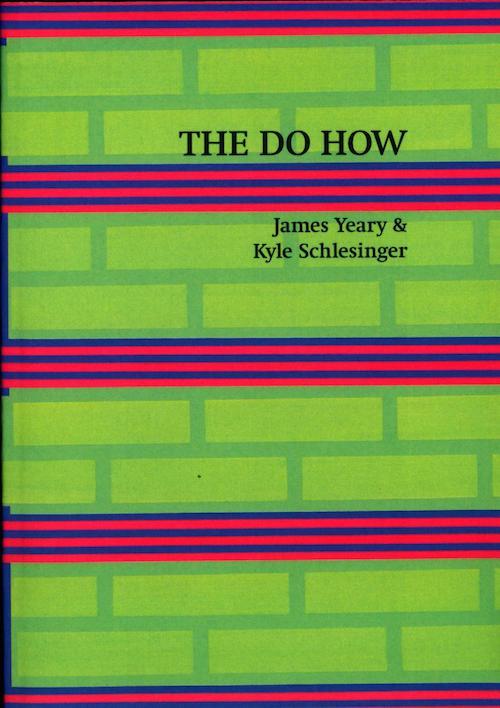
A recent collaborative work that appeared in the mail one day was The Do How (Great Fainting Spells 2013) by Kyle Schlesinger and James Yeary, a completely delightful collab by a couple of great poets who both also happen to be awesome editors and publishers. Their book is a surprisingly thick bit of wonder with poems of heft. I'm not sure what exact procedure they're working off of, but clearly the idea of recycling lines is at work.
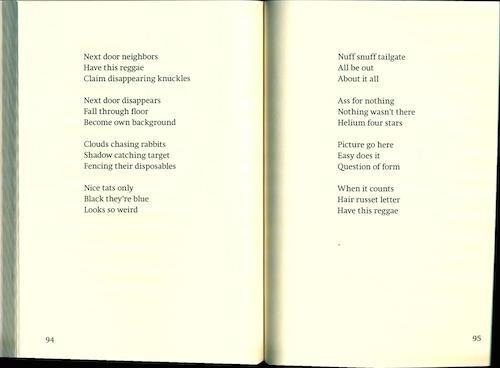
Collaboration teaches invaluable lessons, like: nobody owns the language! That there are no rules, and that you'll totally only ever learn anything by doing it yourself (hopefully surrounded by others doing it too). It's all possible. And a little bit of rebellion will propel any set of poems a long way along the path towards greatness and celebrative bliss upon the slopes of anybody's idea of Parnassus. This is quite a big sandbox we all get to dig around in to see what we come up with. Why not enjoy it.
Patrick James Dunagan was raised a skateboarder in Southern California and became interested in poetry...
Read Full Biography

